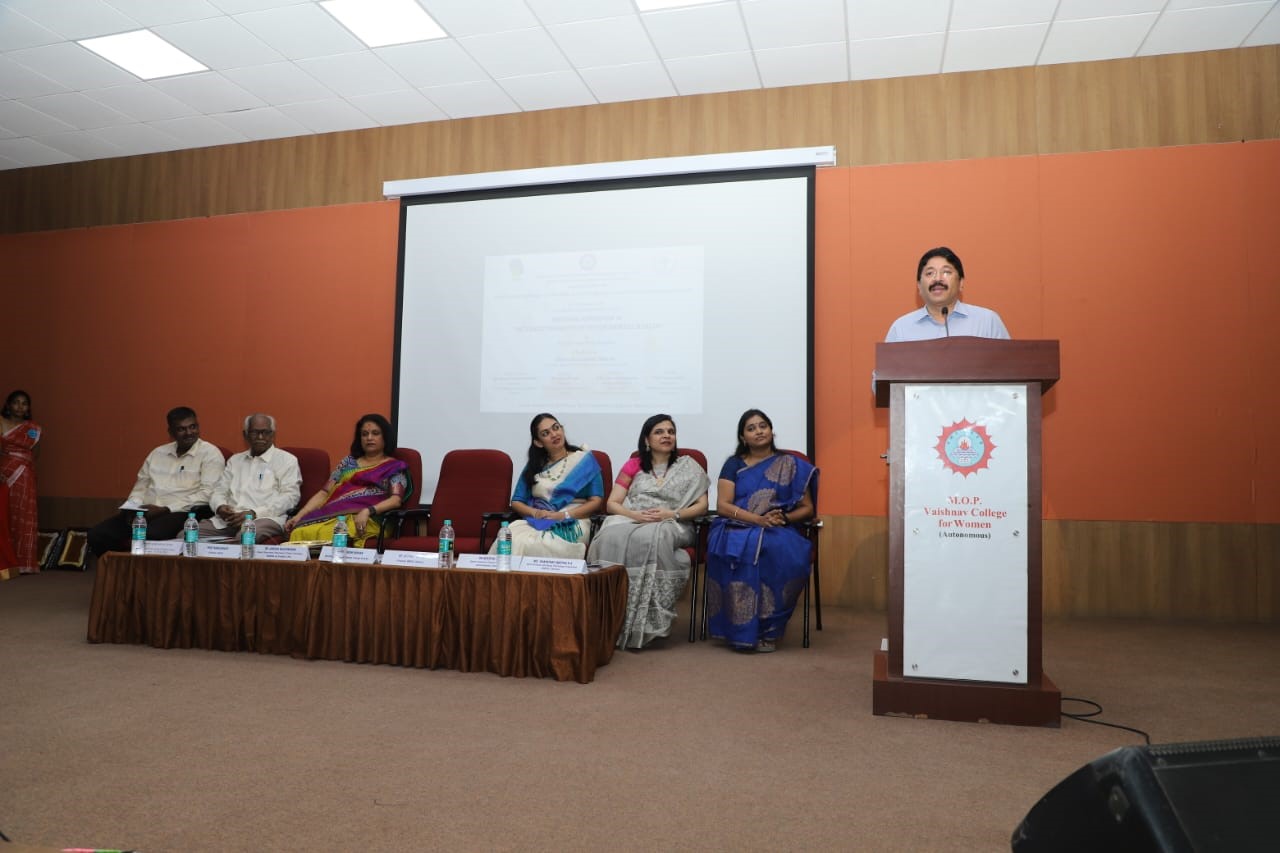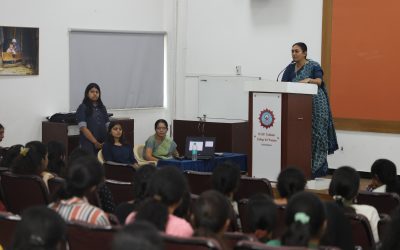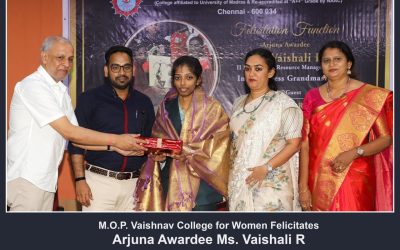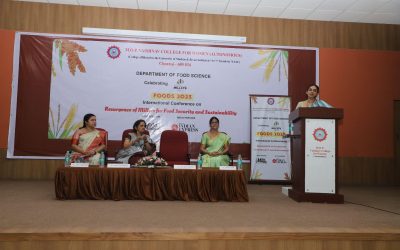On October 16, 2023, World Mental Health Day, the B.Sc. Psychology program of M.O.P. Vaishnav College for Women, in collaboration with the Clinical Psychology Society of India and the Tamil Nadu Association of Clinical Psychologists, hosted the National Level Symposium on “Intersectionality of Youth Mental Health.” It brought together over 400 participants from various institutions across the state to explore critical aspects of mental well-being in today’s youth, rendered by experts in the field of psychology.
The National Symposium was inaugurated with great honor by Thiru Dayanidhi Maran, Hon’ble Member of Parliament, Chennai Central. The symposium witnessed a galaxy of eminent speakers like Dr Rangarajan, DPM, MRCPsych, Consultant Psychiatrist, Psymed Hospital, Chennai, Dr Mohan Raj, MD DNB, Consultant Psychiatrist, Tharu Clinic, Chennai, Dr Jamuna Rajeswaran, Head of Department, Department of Clinical Psychology, NIMHANS and President, CPSI, Prof. Bhasi Sukumaran, Professor and Head, Department of Clinical Psychology, SRM Medical College, Chennai, Dr Keerthi Pai, Senior Consultant Clinical Psychologist, Apollo Hospitals, Chennai, Founder Element H Psychological Support Services, Joint Secretary CPSI, Dr Sujatha Velmurugan, Senior Consultant Psychiatrist, Kaveri Hospital, Chennai, Dr V Sunil Kumar, Senior Consultant Psychiatrist, Founder Mind Zone, Chennai, Dr Srinivasan Jayaraman, Clinical Psychologist, Apollo Proton, Chennai, and, Mrs. Kalyani Rohit, Actor, Influencer, Media Health Activist, Chennai. The highlight of the inaugural ceremony was the Inaugural Address, presented by our esteemed chief guest, Thiru Dayanidhi Maran. In his address, he emphasized the importance and need for mental health among youth.

The National Symposium featured a series of insightful lectures and a panel discussion that shed light on the multifaceted issues surrounding youth mental health. It began with a thought-provoking lecture on the topic “Growing Up,” which covered unique challenges that today’s youth face while growing up, by Dr. Rangarajan DPM. Following which, Dr. Mohan Raj delivered the lecture on the topic “Protective Factors in Adolescents,” delving into identifying protective factors that can help adolescents navigate the challenges they encounter. The next session by Dr. Jamuna Rajeswaran on the topic “Emerging Hope: EEG Neurofeedback in Mental Health Issues” explored the potential of EEG Neurofeedback as an innovative approach to addressing mental health issues in youth. This was followed by a lecture by Dr. Bhasi Sukumaran on the topic “Building a Resilient Mindset,” focusing on the strategies for building a resilient mindset in youth. The last session for the day was the panel discussion on the topic “Suicide Prevention.”. The discussion included strategies for early identification of risk factors and warning signs, intervention, and support systems to prevent youth suicides. It stressed the importance of open communication and breaking the stigma surrounding mental health issues.
The event explored the intricate web of factors that shape the mental well-being of our youth in today’s world. Throughout this symposium, the participants witnessed the power of collaboration, learning from experts, and sharing insights from diverse fields. The intersectionality of youth mental health is not a singular issue but a complex tapestry, where elements of parenting, culture, education, gender, socio-economic status, community, and several other factors intertwine to impact the lives of our young individuals. A discussion on the unique challenges that youth groups face took place, recognizing the urgent need for more inclusive and equitable approaches in mental health care. The program highlighted how one must advocate for mental health policies and programs that account for the richness of identities and backgrounds our youth carry. Empathy, compassion, and understanding are the most potent tools as one works towards a more holistic approach to youth mental health.
The symposium was a platform that oversaw the unique challenges that youth groups face, recognizing the urgent need for more inclusive and equitable approaches in mental health care. It is through this recognition that we can pave the way for healing and growth, ensuring that no young person is left behind. M.O.P. Vaishnav College for Women believes firmly not only in crafting an education programme that shapes responsible and well-informed young mental healthcare professionals through its B.Sc. Psychology programme, but also ensures that its entire student community has access to qualified and experienced counselors to provide able guidance and support for those students who might benefit from it. In the spirit of intersectionality, it is crucial that we not only address the problems at the intersection but also seek solutions that consider the full spectrum of experiences. We must advocate for mental health policies and programs that account for the richness of identities and backgrounds our youth carry.
Empathy, compassion, and understanding are our most potent tools as we work towards a more holistic approach to youth mental health. The final takeaway from this symposium is that the relationships we build, the knowledge we acquire, and the actions we take today can ripple through generations, fostering a society where mental health is a universal right, regardless of one’s intersectional identity.





0 Comments